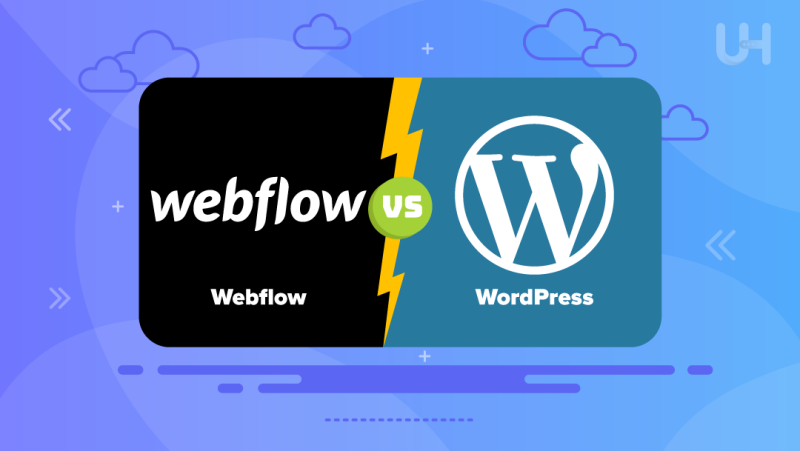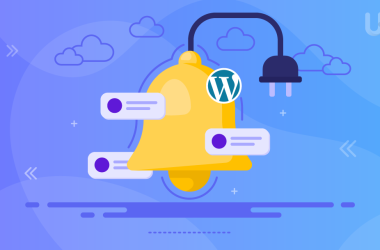Two platforms for building websites have gained immense popularity lately. These are Webflow and WordPress. In our quest to nurture your business growth, we aim to provide a thorough comparison of Webflow vs WordPress in various aspects to help you decide which one better suits your needs.
We’ll delve into the strengths and weaknesses of both platforms, discussing their functionality, template availability, user-friendliness, blogging capabilities, SEO and security. So, should you opt for Webflow or WordPress?
Webflow and WordPress are two popular website-building platforms, each with pros and cons. Comparing Webflow and WordPress will help you understand which tool aligns better with your requirements. We’ll analyze the differences concerning functionality, ease of use, blogging capabilities, SEO optimization, and security. WordPress vs Webflow: you will find the answers to these questions in this article.
Webflow vs WordPress Comparison
When comparing Webflow and WordPress, it’s worth examining the differences and suitability in various contexts. It includes website design, blogging, SEO optimization, and ensuring security.
Functionality and Flexibility
Webflow offers advanced website design tools, allowing total control over the appearance and functionality. On the other hand, WordPress, with its flexibility and rich library of plugins and themes, enables the quick creation of diverse websites.
For this reason, Webflow development may seem more suitable for designers and developers seeking advanced design options, while WordPress is often chosen by those looking for an easy-to-use CMS platform. However, if you have ideas for utilizing plugins, WordPress opens up almost limitless possibilities!
Template and Theme Availability
Although Webflow offers numerous templates and the ability to create websites from scratch, WordPress leaves no illusions about who is the king in this aspect. No platform can match WordPress in terms of template and theme availability.
The popularity of WordPress means it offers a vast selection of free and premium themes, enabling quick customization of the website to the user’s needs. Webflow may be a better choice for designers seeking full control over the design, while WordPress may be more user-friendly for those who prefer ready-made WordPress themes.
Experience the next level of performance and style!
Elevate your website’s speed and reliability with our top-notch hosting solutions tailored specifically for WordPress. Plus, enjoy the added bonus of complimentary premium WordPress themes to give your site a stunning look. Supercharge your online presence today – choose UltaHost for unrivaled speed, security, and style!
Ease of Use and Accessibility for Beginners
Here’s where it gets straightforward. Webflow may appear more advanced to beginners due to its more complex user interface and the need to learn design tools. Conversely, WordPress is much easier to use and more intuitive for those without experience in web design.
Blogging Capabilities
While both Webflow and WordPress support blogging capabilities, WordPress has long been hailed as one of the premier blogging platforms. Its extensive content publishing functionalities, robust comment management features, and seamless integration with various SEO tools contribute to this distinction. So in comparison Webflow vs WordPress for blog, WordPress wins.
SEO (Search Engine Optimization)
Both platforms offer SEO optimization tools, but WordPress has a larger community and more available SEO plugins. Webflow also provides SEO optimization capabilities but may require more effort in configuration. However, when you perform Webflow vs WordPress SEO comparison, it is hard to point the winner. WordPress has a slight advantage, but Webflow also has its pros.
Security
Here, it’s not as easy to compare. In both Webflow vs WordPress, security measures are impressive, but WordPress, due to its popularity, may be more vulnerable to attacks. The abundance of truly advanced security solutions constantly battles creative cybercriminals seeking to exploit the platform’s popularity. To protect your WordPress site from attacks, consider investing in secure WordPress hosting, which will serve as an excellent first line of defense against threats.
Therefore, it’s crucial to regularly update software and adhere to best security practices regardless of the chosen platform. Ultimately, the choice between Webflow and WordPress will depend on the needs, technical skills, and project goals of the user.
Webflow vs WordPress: SEO
Attracting traffic to a website through search engines is a crucial element of success for any blog. Both Webflow and WordPress offer tools and features aimed at improving visibility in search results, but their approaches may differ. As Webflow provides flexibility in customizing website elements, it also allows for better control over primary HTML tags for SEO optimization. It enables manual adjustment of meta tags, URLs, and other elements crucial for content optimization.
On the other hand, as I mentioned earlier, this may require more technical SEO knowledge. Sometimes it might be challenging to utilize the potential of tools available in Webflow. It’s also worth noting the lack of built-in tools for keyword analysis and position monitoring in search results.
WordPress has a vast ecosystem of SEO plugins, such as Yoast SEO or All in One SEO Pack. It facilitates content optimization and result monitoring. It provides easy access to tools for keyword analysis, meta-tag optimization, and sitemap generation. However, it may be more limited in customizing specific website elements for SEO compared to Webflow, and depending on the plugins used, it may be susceptible to compatibility and performance issues.
Webflow vs WordPress: Security
Security is a crucial aspect when choosing a platform for running a website or a blog. Both Webflow and WordPress offer various mechanisms and strategies to ensure security, but their approaches may differ slightly.
Since Webflow is a Software as a Service (SaaS) platform, many security aspects are managed by the Webflow company itself. Users can rely on professional security for server and system infrastructure. Nevertheless, there is always a risk of DDoS (Distributed Denial of Service) attacks or attempts to take control of a user’s account through phishing or social engineering.
Because of its openness and popularity, WordPress is a common target for cyber attacks. Therefore, implementing security measures is crucial to ensure the website’s integrity. Common threats include brute force attacks on login panels, SQL injection attacks on the WordPress database, as well as attacks on plugins and themes. Improving WordPress security is possible by choosing the right WordPress hosting server equipped with efficient security measures.
Webflow provides a range of infrastructure-level security measures, such as data encryption, network traffic monitoring, and firewalls. Additionally, Webflow regularly updates its systems to ensure the latest security patches and fixes. In WordPress, there are many available security solutions, such as plugins to protect against brute-force attacks, file integrity monitoring systems, and data encryption tools. It is also important to regularly update WordPress, plugins, and themes to ensure protection against known security vulnerabilities.
Conclusion
Webflow offers professional and modern tools for creating responsive websites with advanced design, ideal for creative agencies and professional designers. WordPress, on the other hand, remains a leader in blogging and website creation for users with varying levels of experience and needs.
It is not easy to choose Webflow or WordPress. Everything depends, of course, on your requirements and preferences. If your priority is professional design and advanced tools for building websites, Webflow may be the best choice. If you seek greater control over content, a wide array of plugins and themes, and a supportive user community, then WordPress might offer a better solution.
It’s worth conducting your research and tests of WordPress vs Webflow and making an informed choice according to the individual needs and goals of your project. It’s also worth taking advantage of available free trials or consultations with experts to get additional support and advice when choosing the right platform for your website or blog.
Stay ahead of the competition and continuously refine your strategies. To maximize your efforts, consider our virtual server hosting for WordPress. It is a complete hosting package that ensures your website is optimized and always accessible. Your success in the digital landscape is our priority. Get started today and experience the difference with Ultahost hosting.
FAQ
What are the main differences between Webflow and WordPress?
When comparing Webflow and WordPress, consider their functionalities, ease of use, blogging capabilities, SEO optimization, and security measures. Webflow offers advanced website design tools, making it suitable for designers and developers. On the other hand, WordPress is renowned for its vast library of plugins and themes, making it a preferred choice for users looking for a user-friendly CMS platform.
Which platform is better suited for beginners, Webflow or WordPress?
WordPress is generally more beginner-friendly due to its intuitive interface and straightforward setup process. In contrast, Webflow may appear more complex to beginners because of its advanced design features and design tools. However, both platforms offer resources and support to help users get started.
Can I run a blog using Webflow or WordPress?
Yes, both Webflow and WordPress support blogging capabilities. However, WordPress has long been considered one of the best platforms for blogging due to its extensive content publishing features, robust comment management, and seamless integration with various SEO tools.
How can I ensure the security of my website on Webflow or WordPress?
Both Webflow and WordPress offer security measures to protect your website from cyber threats. Webflow, being a SaaS platform, manages many security aspects itself, including server and system infrastructure security. WordPress, on the other hand, is susceptible to cyber attacks due to its popularity, but you can enhance its security by choosing servers equipped with efficient security measures, and regularly updating plugins and themes.













